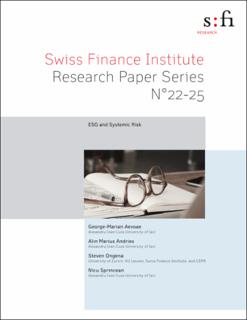ESG and systemic risk
| dc.contributor.author | Aevoae, George Marian | |
| dc.contributor.author | Andrieș, Alin Marius | |
| dc.contributor.author | Ongena, Steven Roger G. | |
| dc.contributor.author | Sprincean, Nicu | |
| dc.date.accessioned | 2023-01-30T13:42:25Z | |
| dc.date.available | 2023-01-30T13:42:25Z | |
| dc.date.created | 2022-10-24T06:29:19Z | |
| dc.date.issued | 2022 | |
| dc.identifier.issn | 0003-6846 | |
| dc.identifier.uri | https://hdl.handle.net/11250/3047172 | |
| dc.description.abstract | How do changes in Environmental, Social and Governance (ESG) scores influence banks’ systemic risk contribution? Using a dynamic panel model, we document a beneficial impact of the ESG Combined Score and Governance pillar on banks’ contribution to system-wide distress analysing a panel of 367 publicly listed banks from 47 countries over the period 2007–2020. Stakeholder theory and theory relating social performance to expected returns in which enhanced investments in corporate social responsibility mitigate bank-specific risks explain our findings. However, only better corporate governance represents a tool in reducing bank interconnectedness and maintaining financial stability. The results are robust to alternative measures of systemic risk, both contribution and exposure, as well as when estimating a static model. Our findings stress the importance of integrating banks’ ESG disclosure into regulatory authorities’ supervisory mechanisms as qualitative information. | en_US |
| dc.language.iso | eng | en_US |
| dc.publisher | Taylor & Francis | en_US |
| dc.title | ESG and systemic risk | en_US |
| dc.title.alternative | ESG and systemic risk | en_US |
| dc.type | Peer reviewed | en_US |
| dc.type | Journal article | en_US |
| dc.description.version | acceptedVersion | en_US |
| dc.source.journal | Applied Economics | en_US |
| dc.identifier.doi | https://doi.org/10.1080/00036846.2022.2108752 | |
| dc.identifier.cristin | 2064095 | |
| cristin.ispublished | true | |
| cristin.fulltext | postprint | |
| cristin.qualitycode | 1 |
Tilhørende fil(er)
Denne innførselen finnes i følgende samling(er)
-
NTNU Handelshøyskolen [1634]
-
Publikasjoner fra CRIStin - NTNU [38294]
